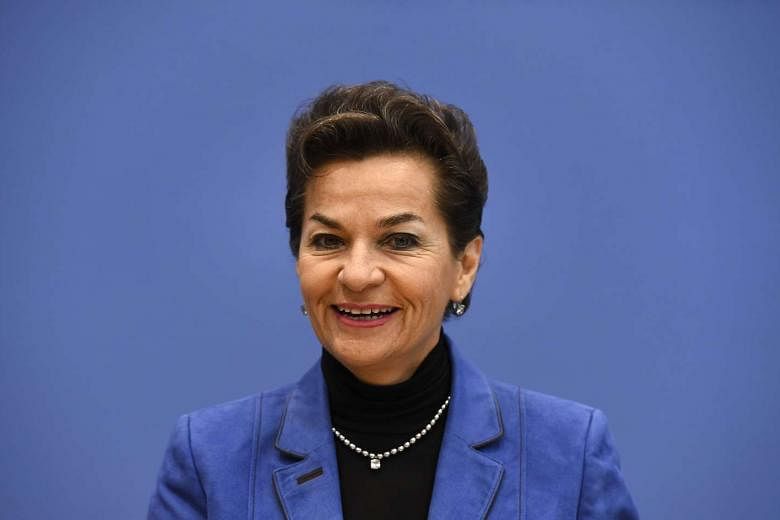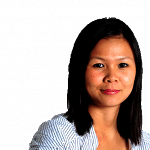This article appeared in the print edition of The Straits Times on October 30, 2012.
SINGAPORE: IT TOOK Singapore eight years to accede to the world's only legally binding climate change agreement - the Kyoto Protocol.
When it did so in 2006, it was one of the last few countries to do so. But despite being "late to the party", the Republic has since become one of its stars, says United Nations climate chief Christiana Figueres.
The world's top climate official, who visited Singapore for the first time last week, says that behind closed doors at the United Nations Framework Convention on Climate Change (UNFCCC) negotiating sessions, the country's delegation has been "active and effective" in the years since 2006.
Singapore is now known in the climate change circles for its "timely, incisive and problem- solving participation" in a process that seeks a global agreement that would legally bind every country to do their bit to reduce pollution and avoid catastrophic climate change.
Negotiators meet around the year, but annually, they converge for a big summit at year end for the Conference of the Parties (COP) under the UNFCCC.
Last year, in Durban, South Africa, a breakthrough of sorts was reached when all countries agreed on a "road map" that would guide them to a global deal to cut carbon, regarded as the culprit for climate change, in 2015 or earlier.
But while Singapore is perceived as an active player in the international negotiations, its personal story is yet to be told in a clear and compelling way, says Ms Figueres.
"What it has done as a city on vehicle control, energy efficiency and waste management… is quite remarkable. It can be told in a more compelling way, for other cities to study," she tells The Straits Times in a recent interview.
The 56-year-old has been in the hot seat for two years now, since she took over from Dutchman Yvo de Boer, who presided over several milestones achieved by the UNFCCC prior to his resignation in 2010.
The high-profile COP meeting in Copenhagen in 2009 marked a point when climate change moved from the fringe into mainstream consciousness, but the contentious talks were criticised by many as a failure when developed and developing countries bickered until the very last day, resulting in a weak Copenhagen Accord which was not adopted as an official UN document.
Ms Figueres, who is from Costa Rica and has more than a decade of experience in climate negotiations, admits that after Copenhagen, there was a general sense of malaise.
"The mood was bad, and my top priority (after being appointed) was to change that quickly so we could progress on the negotiations," she recalls.
The UN body made special effort in the COP meetings that followed in Cancun, Mexico, and Durban in the next two years to ensure that the process was transparent, inclusive and fair.
"Now there's more of the spirit of give and take with countries and this is why we've been able to progress," she says.
But critics of this multilateral process often describe it as inefficient and too slow.
To this, she admits that the process can be cumbersome. Still, it is crucial because climate change is a global problem and greenhouse gas emissions do not respect national boundaries.
"Building a response to the adverse effects of climate change without including all countries is analogous to building a hospital where the sick are not allowed in," she adds.
Her no-nonsense approach has breathed a fresh air of determination to the process. She has been known to tell negotiators: "I won't hear that this is impossible. Governments must make it possible for society, business and science to get this job done."
Ms Figueres, who is married with two daughters, points out that a multilateral solution must be urgently reached as there are millions of people who are extremely vulnerable to the effects of climate change such as sea level rises or extreme weather events such as floods and droughts.
"We have a moral responsibility towards the most vulnerable of the world," she declares.
Her disposition for public service is a family trait - her father, Mr Jose Figueres Ferrer, was president three times and a revolutionary who abolished the army, nationalised the banks and gave women and black people the right to vote. Her brother, Mr Jose Maria, was one of Latin America's youngest presidents at age 39.
The country has set a target to be the world's first carbon neutral country by 2021.
Ms Figueres says: "My father's dedication to the country was motivated by contributing to the welfare of the most vulnerable, those at the bottom of the pyramid - that was his guiding light... The work on climate change is no different from that."
She may be climate chief but it does not bother her if the average person does not know who the UNFCCC is or what the COP achieves.
"I don't think everyone needs to know what the COP is. What is more important is for every person on the street to be aware of what their carbon footprint is, why that's important and how they can contribute to reduce it."
Ms Figueres, who in 2001 received the Hero for the Planet Award from National Geographic Magazine, highlights a recent survey conducted in Singapore on attitudes towards climate change.
The results, which showed that 86 per cent felt a sense of responsibility in playing their part to address the problem, is "very unusual", she says, but a "huge asset that Singapore can mobilise because there seems to be broad public support".


